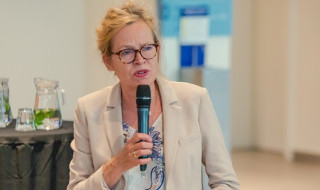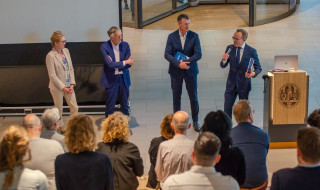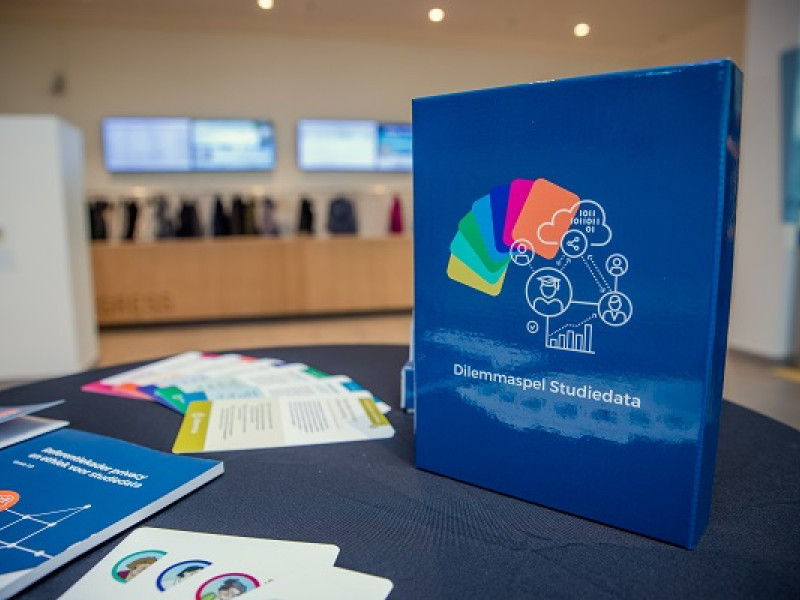"We need the trust of our students and staff if we want to use study data successfully."
Using study data responsibly? Start the conversation
As a sector, we want to deal responsibly with study data and at the same time utilise the opportunities it offers. Since May 2022, the Dutch Privacy and Ethics Reference Framework for Education Data has been available, which can play an important role for institutions.
More and more data are becoming available within institutions. This is due to digitisation, more flexible and increasing use of digital learning resources. The opportunities for improving education through the use of study data are also increasing. This trend will continue for the time being.
The institutions have now received the Framework of Reference but also accompanying dilemma Data Protection Officers are facing now. It is now time to get to work. This is already happening in various places.
Lack of clarity as a limiting factor
Application of the Reference Framework requires institutions to organise the conversation. The discussion about the values we as a sector believe are important and about the way in which the use of data is accounted for. “That is a broader conversation than with the privacy officer, data management officer and the board of directors,” says Arthur Mol, chairman of the steering committee of the Acceleration Plan and rector magnificus of Dutch Wageningen University & Research. “We need to get the ideas broadly accepted within an institution, otherwise we will not succeed.”
Miek Krol, data protection officer at the UvA (University of Amsterdam) and involved in drawing up the Reference Framework: "Staff members dealing with study data often think that nothing, or very little, is allowed." She points out that in fact a lot is allowed, as long as you are transparent and record things properly.

Anka Mulder, Saxion Hogeschool
Anka Mulder, chair of Saxion's executive board, also noticed that a lack of clarity about what is allowed, possible or desirable stands in the way of innovation: "It was a lesson to me to notice that we first had to investigate what was not allowed with study data. Of course I was eager to know what we were allowed to do. But by talking about what is and what is not allowed, we became more aware and space was created to talk about the dilemmas inherent in the use of study data.”
The fact that data is available, and the law is followed by the letter, does not yet mean that it is also desirable to use data in education. Joeri van den Steenhoven, member of the executive board of Leiden University of Applied Sciences: “As a sector, we are becoming increasingly aware of the public values we wish to uphold. Particularly outside the sector, questions of ownership, transparency and the way you use data are putting pressure on public values. Complying with the law is therefore not always enough; we need the trust of our students and staff if we want to use study data successfully.”

Pieter Duisenberg (UNL) en Maurice Limmen (VH) recieve their copy of the Reference Framework.
Call for a framework
In recent years, the need for the careful and responsible use of data in education has been frequently highlighted. As early as 2019, the rectores magnifici called for us to work together to protect the autonomy and freedom of our education. In the same year, the previous Minister of Education expressed the desire to develop frameworks in her Strategic Agenda for Higher Education. In a report published this year, the Rathenau Institute outlined the complex task the education sector is facing in the coming years, and emphasised the importance of protecting public values. And last year, the Dutch Personal Data Authority (AP) recommended that the sector ‘together with sector councils, umbrella and collaborative organisations, should continue to identify risks and translate them into a concrete code of conduct and guidelines for educational institutions.’ (Source: Digitalisation of Education, 2021).
This Framework was drawn up with experts from inside and outside higher education and is supported by the entire sector.

Bram Enning (center), University of Applied Sciences Leiden
The Reference Framework is an important answer to these questions. It was drawn up with experts from inside and outside higher education and is supported by the entire sector. ‘That alone is quite an achievement,’ says Bram Enning, leader of group Study Data zone of the Acceleration Plan, which was the initiator of the drafting of the Framework. ‘It is a framework of the sector to which administrators, privacy officers, researchers, policy makers and students have contributed.’ The Frame of Reference was embraced by administrators of the Education and Research Steering Group of Universities of the Netherlands (UNL), and of the Education Executive Committee of the Netherlands Association of Universities of Applied Sciences (VH).
"The Reference Framework is normative and therein lies the added value."
"What you can do with learning analytics goes so much further than you think. How fast a student reads, which questions the student asks. Artificial intelligence (AI) can already determine from the way a student studies whether the student has mastered the material."
How to proceed?
The document is a framework; the concrete implementation must come from the institutions themselves. "Yes, there is now a reference framework, and we have to make use of that, but as an institution you also have your own values," adds Marlon Domingus, data protection officer at Erasmus University.

Marlon Domingus, Erasmus Universiteit
"For example, we have the Erasmian values, which stand for world citizenship, social commitment and an open and critical mind-set. In addition to the Reference Framework and the legal framework, an institution can also give its own further interpretation to safeguards and measures to be taken."
To get the conversation going within an institution, a ‘dilemma game’ has been developed, which touches on all facets surrounding the use of study data and always relates it to the Frame of Reference. "As a sector, we find the ethical principles important," says Marlon Domingus. "We do not limit ourselves to discussing whether something is legally allowed, but ask ourselves whether we should want to do something. It's great that we now have this document that sets out what we as a sector consider important, and how we give substance to it - to protect the rights and freedoms of the individuals who entrust us with their data, but also on a higher level: the sector's protection of public values."
Are you going to work with the Privacy and Ethics Reference Framework for Education Data within your institution, and do you run into questions? Do not hesitate to send a message to group leader Bram Enning. Your question will then be forwarded to the right expert.
Privacy and Ethics Reference Framework for Education Data
Dilemma Game Privacy and Ethics for Education Data
Text: Maureen van Althuis
Pictures (launch event): Armando Ello
'Verantwoord studiedata benutten? Ga het gesprek aan' is een artikel van SURF Magazine.
Vragen naar aanleiding van dit artikel? Mail naar magazine@surf.nl.
